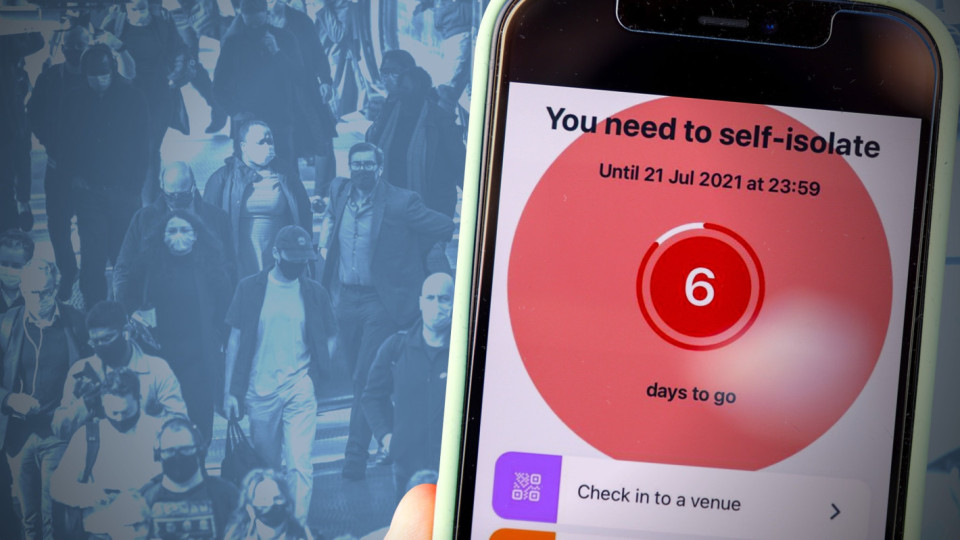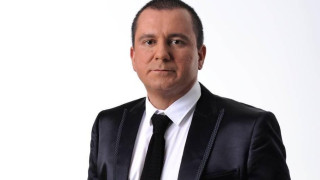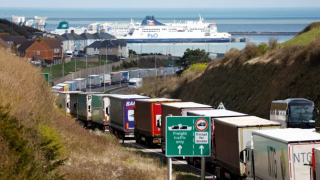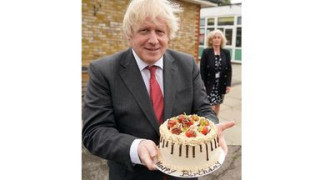
AstraZeneca says antibody treatment reduces risk of symptoms by 77%; North West and Yorkshire and the Humber have highest COVID rates in England; UK regulator approves first dedicated-coronavirus drug treatment
Chief medical officer reflects on 'four weeks working on a COVID ward'
Professor Chris Whitty, the government's chief medical officer, has tweeted to urge people to get vaccinated after working for four weeks on a coronavirus hospital ward.
Prof Whitty said that the "majority of our hospitalised COVID patients are unvaccinated and regret delaying".
"Some are very sick," he added.
The great majority of adults have been vaccinated.
Four weeks working on a COVID ward makes stark the reality that the majority of our hospitalised COVID patients are unvaccinated and regret delaying. Some are very sick including young adults.
Please don't delay your vaccine.— Professor Chris Whitty (@CMO_England) August 20, 2021
People in England aged 35 to 49 years old see COVID-19 increase while older children, younger adults and over 69s see decrease
The percentages of people testing positive have decreased for those in Years 7 to 11, people aged 24 to 34 years, and aged 70 and over.
You can see how each age group's positivity rate has changed in these charts (only available for England as the devolved nations' populations are too small for this grouped analysis):
Percentage testing positive varies across areas of the UK
This is ONS data for the week ending 14 August. Select an area to see the percentage of the population testing positive for COVID-19 there.
North West and Yorkshire and the Humber highest rates of COVID-19
In the week ending 14 August, the percentages of people testing positive increased in the East of England.
The West Midlands (0.67% of people tested positive), East Midlands (1.05%) and North East (1.22%) saw a drop from the previous week.
In the South East (0.97%) and London (1.42%), percentages levelled off compared with the week before.
Yorkshire and the Humber remains the highest with 1.69%, the North West is second highest at 1.66% and the South West is at 1.06% - but all those have an uncertain trend as their movements are so small.
Percentage of people testing positive for COVID-19 decreased in England and Scotland, increased in Wales, uncertain in Northern Ireland
This is the latest ONS Infection Survey, from the week ending 14 August - just published.
One in 80 people in England had COVID in latest week - ONS
The Office for National Statistics reports 698,100 people within the community in England had COVID-19 in the week ending 14 August.
That's a decrease from the week before when it was one in 75.
In Wales, it increased, with one in 30 having COVID-19 - 23,500 people
For Northern Ireland, the trend was "uncertain", with around one in 50 people with COVID-19 - 35,300 people.
Scotland saw a continued drop, with one in 200 people with COVID - 25,900.
Martial artist who starred in Kill Bill films dies after COVID test
Japanese actor and martial artist Sonny Chiba, who appeared in the Kill Bill films, has died aged 82.
Chiba, known in Japan as Shinichi Chiba, starred in more than 100 films during his career, first rising to international fame in the 1970s.
Quentin Tarantino then cast him as Hattori Hanzo, a master swordsmith, in Kill Bill.
He died in a hospital near Tokyo where he had been treated for COVID-19 since 8 August, his management office, Astraia, said.
Chiba had not been vaccinated, they added.
You can read the full story here.
Gloucester agricultural college first UK university to make vaccines mandatory for students
A specialist agricultural and veterinary nursing college is the first in the UK to effectively make vaccines compulsory for students.
Hartpury University and College in Gloucester says students will be banned from living on campus and may be excluded from social activities if they don't take up their jabs, according to The Daily Telegraph.
The college has also imposed mandatory jabs on anyone wishing to keep a horse in its stables.
In a statement published on its website, it said: "Our expectation is that all eligible students will engage and take up their vaccinations as soon as they are given the opportunity.
"In order to benefit from the most effective protection against COVID, it's a mandatory requirement that all eligible students in on-site residential accommodation will engage in the COVID vaccination programme and have both doses of the vaccine when made available to them."
It continued: "It's highly likely that eligible students who aren't vaccinated will be limited in terms of access to student social events and venues on the Hartpury campus, amongst other limitations.
"This is in line with the national picture, where vaccination proof may be required in the autumn for entertainment/hospitality for all adults."
Hartpury said the requirement does not apply to students who cannot have the vaccine due to medical exemptions.
Blue singer Lee Ryan says he can't pay driving fine because of COVID
Blue's Lee Ryan has told a court he has no money after being fined and banned from driving for failing to provide information about who was behind the wheel of his car.
The singer appeared at Peterborough Magistrates' Court via remote link from Spain on Thursday, where he was disqualified from driving for 12 months and fined £660.
But the 37-year-old said he was "out of work at the moment due to COVID," after being ordered to pay £1,501 in total, including court costs.
"I'm not working. I mean, they've stopped the gigs. I don't have any gigs. They've stopped everything because of the pandemic. There's still no shows going on," he told the judge.
It was put to Ryan that there are shows going on in the UK, but he said: "I've not got anything. I haven't got anything."
Asked if it would be unreasonable to think he may have some savings, he said: "No, I spent them all in COVID."
You can read the full story here.
Pic: Lee Ryan and his girlfriend, Rex
Severely disabled teenager with respiratory problems given lifeline vaccine under new guidance
Logan Quinn, 13, from Kilsyth, Scotland, has serious respiratory problems and a rare neurological condition.
He previously shielded from coronavirus, but has become one of 4,000 children with neuro and other disabilities in Scotland to be given a COVID vaccine under new public health guidance.
Earlier this month, the Scottish Government announced children aged 12 to 17 with certain conditions would be offered a Pfizer vaccine in line with recommendations from the Joint Committee on Vaccination and Immunisation (JCVI).
His mother Donna Quinn said: "We've done as much as we can, I can't make him bulletproof, but I can just do as much as I can to move forward and start living again.
"He's about to be 14 next week and I've had to have faith in science and medical experts for him to be alive today.
"I've nearly lost Logan on so many occasions. It was for him to live and experience life and be with friends and family."
Pic: PA
Israeli prime minister gets third vaccine dose
Israel's prime minister Naftali Bennett received his third dose of the coronavirus vaccine on Friday.
The 49-year-old was given the Pfizer-BioNTech jab.
He said: "If you go get the third short we can avoid a fourth lockdown."
Israel has been giving out third booster doses since July. The rollout began with people over 60, before being dropped to 50 as the Delta variant started to spread.
Health officials are now saying anyone over 40 can have a third dose if their second was at least five months ago.
The focus for younger people getting a booster jab is on teachers, healthcare workers, carers for the elderly and pregnant women.
Third doses have been authorised in the US and the UK.
But WHO experts have criticised richer countries for offering booster jabs before poorer ones have had any.
Pic: Reuters
1,189 people have died from Delta variant as of mid-August
New data from Public Health England shows that 1,189 people have died within 28 days of testing positive for the Delta variant of COVID as of mid-August.
Out of 1,189 - 113 of them were under the age of 50, 72 of which were unvaccinated, 11 had received one dose of a vaccine and 27 had been given both doses.
Public Health England has also revealed that 7,285 have been hospitalised with the COVID variant, 4,112 of which were under the age of 50.
The data covers the period between 1 February and 15 August.
K-pop stars BTS cancel world tour due to pandemic
K-pop superstars BTS have officially cancelled their world tour amid uncertainty caused by the pandemic.
The boy band had been due to embark on the tour in April last year before it was postponed by the crisis.
But the new tour, which had planned stops in cities including London, Toronto and Tokyo, has now been cancelled too.
In a translated statement, Bighit Entertainment, South Korea-based BTS's label, said: "Our company has worked hard to resume preparations for the BTS Map Of The Soul tour, knowing that all fans have been waiting eagerly and long for the tour.
"However, due to changing circumstances beyond our control, it has become difficult to resume performances at the same scale and timeline as previously planned.
"Therefore we must announce the cancellation of the BTS Map Of The Soul tour."
Pic: AP
Prime minister hails first COVID drug to be approved in UK
Boris Johnson has tweeted his support of the UK regulator approving its first coronavirus-specific drug treatment today.
Reonapreve uses monoclonal antibodies (man-made proteins) that act like natural ones to prevent coronavirus infection (see 8.42 post).
AstraZeneca says antibody treatment reduces risk of COVID by 77%
UK pharmaceutical giant AstraZeneca has today announced that its coronavirus antibody treatment reduces the risk of symptomatic coronavirus by 77%.
More than 75% of people involved in the drug trial had chronic conditions, including many who have a reduced immune response to vaccination.
This means that the firm's antibody treatment could offer an alternative to vulnerable people who cannot take a vaccine.
The remedy was first discovered by Vanderbilt University Medical Center in the US, but has been developed in the UK by AstraZeneca.
It comes as the UK regulator approves its first antibody drug for coronavirus for use in Britain (see 8.42 post).
87% of adults 'likely or very likely' to take up booster COVID vaccine
The Office for National Statistics (ONS) has just released its latest opinions and lifestyles survey.
It shows that 87% of adults polled in the UK would be likely to take up the offer of a third dose of a COVID vaccine.
The survey also reveals that 89% of people are wearing masks outside their home (down from 90% the previous week) and numbers maintaining social distancing fell from 49% to 46%.
A total of 86% (down slightly from 88% the previous week) still feel that measures to slow the spread of COVID are important.
New Zealand lockdown extended until Tuesday
New Zealand's lockdown has been extended by five days as cases continue to rise.
The nationwide lockdown imposed on Wednesday was due to end on Friday, except in Auckland, but Prime Minister Jacinda Ardern said the whole country needs to be on "high alert" while cases go up.
"We have been here before...we know the elimination strategy works," Ardern told a news conference on Friday.
"Cases rise and then they fall until we have none. It's tried and true...we just need to stick it out."
New Zealand had been living virus-free with no restrictions for months until Ms Ardern announced the lockdown this week.
It started with one case of the Delta variant in the community, which has now increased to 31 infections.
Cases were confined to Auckland at the beginning of this week but have now spread to Wellington.
"We just don't quite know the full scale of this Delta outbreak," Ardern added. "We want the whole country on high alert right now,” Ms Ardern added.
Australia's most populous state - New South Wales - is also in lockdown, with measures not due to lift in Sydney until the end of next month (see previous post).
Pic: Empty streets in Wellington, Reuters
Sydney lockdown extended to end of September
Lockdown has been extended in Sydney after a further 642 cases were confirmed in New South Wales on Friday.
The lockdown in Australia's largest city was due to end on 28 August.
But with infections still rising, officials have now said it will go on until 30 September. They have also put a 9pm to 5am curfew in place from Monday across Sydney's worst affected suburbs.
Sydney has been locked down since late June after the more contagious Delta variant was detected in a limousine driver who became infected while transporting a US cargo aircrew from the airport.
The entire state has been in lockdown since last week.
Wearing masks will now also be compulsory across the state outside homes, after previously masks were not compulsory in all circumstances outdoors.
Pic: AP
Parliamentary staff urge Speaker to crack down on mask wearing in the Commons
Trade unions representing parliamentary staff have urged Commons Speaker Sir Lindsay Hoyle to take action to ensure MPs wear face masks in the chamber.
The Commons was the most crowded it has been since before the pandemic for the Afghanistan debate on Wednesday.
MPs were sat with no social distancing and a large number, including PM Boris Johnson, were not wearing masks.
Mike Clancy, general secretary of Prospect, said all MPs should take the "basic step" of wearing face masks to protect staff.
He said: "Unions will not stand by while staff are put at risk by reckless politicians and following this shameful episode we are once again asking the Speaker to take a tougher line with MPs when Parliament returns next month."
Pic: PA
Nine in 10 people in the UK thought to have antibodies
In case you missed it yesterday, new ONS data shows that 94.2% of people in England and at least 90% in the other three home nations have antibodies for coronavirus.
The data refers to people outside care homes and hospitals.
It's positive news, but counterbalanced by the Oxford University study out on Thursday that confirmed people can still be infected and transmit the Delta variant even if they are fully vaccinated.
UK approves its first ever COVID-specific drug
The UK has approved its first drug that uses Monoclonal antibodies to fight coronavirus.
Reonapreve, developed by the pharmaceutical firms Regeneron and Roche, uses Monoclonal antibodies, which are man-made proteins that act like natural human antibodies to fight infection.
Regulator - the Medicines and Healthcare products Regulatory Agency (MHRA) - said the clinical trial data they had assessed has shown Ronapreve may be used to prevent infection, treat symptoms of acute coronavirus and can reduce the likelihood of being admitted to hospital due to the virus.
Trials took place before widespread vaccination and before the emergence of virus variants.
Japan was the first country to licence the drug back in July, but the US, EU and other nations have now followed suit.
Health Secretary Sajid Javid said approval of the first drug designed specifically for coronavirus in the country is "fantastic news" and he hoped it could be rolled out for patients on the NHS "as soon as possible".
Third doses only needed for most vulnerable - government adviser
Booster coronavirus jabs will only be needed for those who are "very unlikely to be well protected by the first two doses", a vaccine adviser to the government has said.
The Joint Committee on Vaccination and Immunisation (JCVI) met on Thursday to discuss potential changes to plans to give all over-50s a third COVID jab this autumn.
Committee member Professor Adam Finn said a decision is imminent that only those who are clinically most vulnerable to the virus should be offered a booster dose.
His comments on a wider rollout were echoed by another government adviser, Professor Peter Openshaw, who said further evidence is needed on any benefits booster jabs might bring.
Prof Openshaw, a member of the New and Emerging Respiratory Virus Threats Advisory Group (NERVTAG) which advises the government, also said high case numbers and deaths are "very worrying" and warned that "we just don't really know what's going to happen" as winter approaches.
Key points:
- UK regulator approves its first ever COVID-specific drug treatment (8.42 post)
- AstraZeneca says its drug reduces risk of symptomatic COVID by 77% (9.46 post)
- JCVI considering whether only most vulnerable are given booster jabs in September (8.30 post)
- Antibody levels in England at 94.2% and over 90% in each of home nations (8.51 post)
- COVID cases in England increase by 6% after a two week fall
- UK reports 36,572 new cases and 133 virus-related deaths on Thursday
- K-pop superstars BTS forced to cancel world tour over COVID concerns (10.10 post)
- Live reporting by Lara Keay
Good morning
And welcome to another day of our live coronavirus coverage.
As always we'll bring you all the latest lines on COVID from the UK and around the world.






















Leave a comment